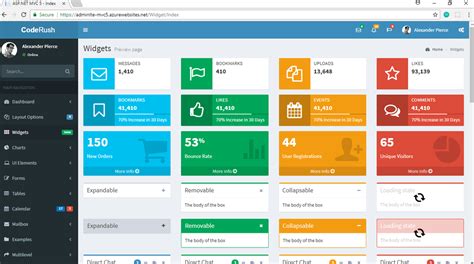Asp.Net MVC templates have revolutionized the way we build web applications, providing a solid foundation for rapid web development. With the ever-increasing demand for fast and efficient web development, Asp.Net MVC templates have become an essential tool for developers to speed up their development process.
The importance of Asp.Net MVC templates cannot be overstated. By providing a pre-built structure and set of tools, these templates enable developers to focus on the core logic of their application, rather than wasting time on mundane tasks such as setting up the project architecture. This, in turn, enables developers to deliver high-quality applications quickly and efficiently, meeting the demands of businesses and clients.
In this article, we will explore the world of Asp.Net MVC templates, discussing their benefits, types, and how to use them for rapid web development. We will also delve into some of the most popular Asp.Net MVC templates available in the market, highlighting their features and advantages.
What are Asp.Net MVC Templates?
Asp.Net MVC templates are pre-built project templates that provide a basic structure and set of tools for building web applications using the Asp.Net MVC framework. These templates are designed to help developers get started with their projects quickly, providing a solid foundation for building robust and scalable web applications.
Asp.Net MVC templates typically include a set of pre-built views, controllers, models, and other necessary components to get started with a web application. They also provide a set of common tools and features, such as authentication, authorization, and data access, to speed up the development process.
Benefits of Asp.Net MVC Templates
Asp.Net MVC templates offer a wide range of benefits for rapid web development, including:
- Faster Development: Asp.Net MVC templates provide a pre-built structure and set of tools, enabling developers to focus on the core logic of their application, rather than wasting time on mundane tasks.
- Improved Productivity: By providing a set of common tools and features, Asp.Net MVC templates enable developers to work more efficiently, reducing the time and effort required to build a web application.
- Consistency: Asp.Net MVC templates provide a consistent structure and set of tools, ensuring that web applications are built in a consistent and predictable way.
- Reduced Errors: By providing a set of pre-built components and tools, Asp.Net MVC templates reduce the likelihood of errors and bugs, ensuring that web applications are more reliable and stable.
Types of Asp.Net MVC Templates
There are several types of Asp.Net MVC templates available, including:
- Basic Template: A basic template provides a minimal set of tools and components to get started with a web application.
- Empty Template: An empty template provides a completely blank project, allowing developers to start from scratch.
- Internet Application Template: An internet application template provides a set of pre-built tools and components for building web applications, including authentication, authorization, and data access.
- Intranet Application Template: An intranet application template provides a set of pre-built tools and components for building internal web applications, including authentication, authorization, and data access.
Popular Asp.Net MVC Templates
Some of the most popular Asp.Net MVC templates include:
- Microsoft's Official Template: Microsoft's official template provides a comprehensive set of tools and components for building web applications, including authentication, authorization, and data access.
- ASP.NET Boilerplate: ASP.NET Boilerplate is a popular template that provides a set of pre-built tools and components for building robust and scalable web applications.
- Scafolding: Scafolding is a template that provides a set of pre-built tools and components for building web applications, including authentication, authorization, and data access.
Using Asp.Net MVC Templates for Rapid Web Development
To use Asp.Net MVC templates for rapid web development, follow these steps:
- Choose a Template: Choose a template that meets your needs, depending on the type of web application you are building.
- Create a New Project: Create a new project using the chosen template.
- Customize the Template: Customize the template to meet your needs, adding or removing components and tools as necessary.
- Start Building: Start building your web application, using the pre-built tools and components provided by the template.

Gallery of Asp.Net MVC Templates





FAQs
What are Asp.Net MVC templates?
+Asp.Net MVC templates are pre-built project templates that provide a basic structure and set of tools for building web applications using the Asp.Net MVC framework.
What are the benefits of using Asp.Net MVC templates?
+The benefits of using Asp.Net MVC templates include faster development, improved productivity, consistency, and reduced errors.
What types of Asp.Net MVC templates are available?
+There are several types of Asp.Net MVC templates available, including basic, empty, internet application, and intranet application templates.
Asp.Net MVC templates have revolutionized the way we build web applications, providing a solid foundation for rapid web development. With their pre-built structure and set of tools, these templates enable developers to focus on the core logic of their application, rather than wasting time on mundane tasks. By choosing the right template and customizing it to meet your needs, you can build robust and scalable web applications quickly and efficiently.
